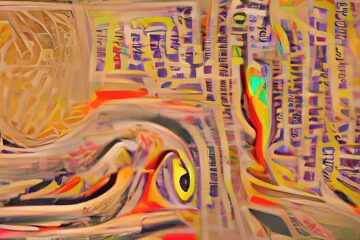I was planning to write about NFTs as mechanisms of speculation that build hype around digital currencies to attract new investors. But when the news broke that Elon Musk made a $43B offer to buy Twitter, the social media version of the internet’s town square,[1] his mars-shot move made my NFT idea seem like an unforgivably puny analysis of internet structuralism.
But with a message-in-a-bottle interest in responding to the news of a company that had occupied the space of an almost public utility in broad imagination, what does Musk’s bid to privatize Twitter tell us about what is new in the attention economy?
If money is the blood of the global economy, hype is the blood of the internet. Hype’s conceit of authenticity makes it similar but much more than PR or marketing. It circulates via content, hubris, humor, and vibe to instill values and build trust, drawing boundaries around communities in the process. It traffics in code to transmit ideas that tell the receiver, “we know, you are like us.” Crypto, DAOs, discord servers—all the bits and atoms that comprise web3 world are a response to the idea that influence over wide-spread community participation is the currency of the future. With an abstraction like influence becomes central to value, in systems like crypto or just ‘tastemaking’ as its own currency, the circuit of hype, value, and money is excessively cozy. But all these systems still obey one old rule, they need new users to grow. So, when social media platforms like Twitter hack individual human neurology and psychology by orders of magnitude, hype becomes truth. The bid on Twitter emphasizes the company’s value is its potential to commercialize the infrastructure of cultural influence that brings in new dumb money.
When Musk peddles his offer to buy Twitter as motivated by the desire to ‘defend free speech to protect civilization’[2] he is pandering to the disaffected who feel left out of the gains of globalization. The messaging embedded in the hype around speculation in digital currencies is “buy in now, or have fun being poor.”[3] It exploits the awareness creeping up the class strata of being already, if not imminently, chum in convoluted economic waters. Memes, NFTs, and viral tweets are just units of measurement of “this is your chance.” Early adopters are already on Discord, but Twitter controls the pipeline to these not yet bought-in needed to grow the pie. So, while I’m not suggesting that Musk’s bid was an attempt to buy the digital mint per se, I am suggesting it’s an attempt to control the paper and ink supply, and that this is meaningfully more calculated.
It is said that we over-estimate what can happen in five years and underestimate what can happen in 10. Zooming out on Musk’s other holdings, an image emerges of his positioning his businesses based on a vision of the future of global infrastructure: Tesla batteries store renewable energy and SpaceX offers global satellite internet and eventually means of escape off earth. The Twitter offer tips Musk’s cards at a vision of a future in which influence drives value in some kind of global currency system based on critical mass of influence. In the near-term, owning Twitter would provide the message amplification infrastructure necessary to get any kind of crypto-currencies over the speculative-asset hump and transition it to mainstream global fiat[4].
To be sure, Twitter isn’t the only company with this business model, but it is the smallest and therefore most purchasable of the social media utilities. Whether or not the sale happens, the offer highlights these companies as far from neutral entities with the power and responsibility to moderate communication. Can we create a UN-like body of international public and private representatives to ensure these businesses are operating in humanity’s interest? It might be our only option.
Sources
[1] Elon Musk Makes $43 Billion Bid for Twitter, Says ‘Civilization’ At Stake
[2] Elon Musk’s Twitter Investment Could Be Bad News for Free Speech
[4] Beyond personal holdings in Ethereum, Bitcoin, and Dogecoin, last week Musk and Twitter-CEO-emeritus Jack Dorsey announced a joint venture to build a bitcoin mining facility using Tesla solar-powered batteries in West Texas. https://www.bloomberg.com/news/articles/2022-04-08/tesla-to-partner-with-block-to-mine-bitcoin-at-texas-solar-plant
Kim Córdova is an art writer interested in the way that expressions of culture reflect the politics, economics, and power constructs of the contexts in which they are made. She is a first-year MDes Student at the Harvard Graduate School of Design. Her critical writing was twice shortlisted for the International Award for Art Criticism (IAAC) and was selected for the 2020 Andy Warhol Foundation Art Writer Workshop. She is a Zhi-Xing Eisenhower Fellow.




0 Comments